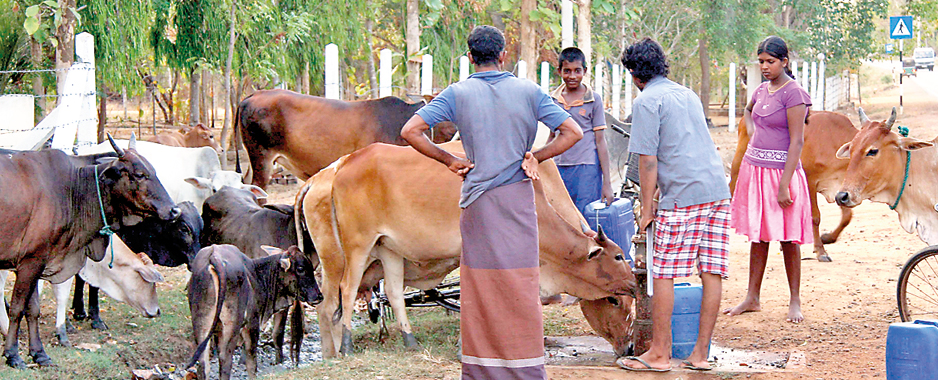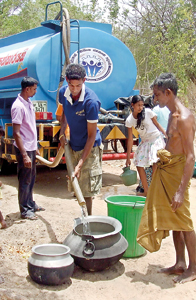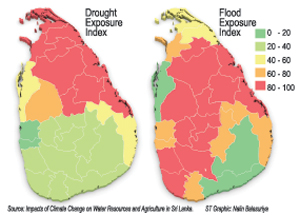News
Desperate farmers seek help
The crippling drought that has ruined thousands of cultivated acres across the country has driven more than 230,000 farmers to seek compensation from the Government. Scientists warn that extreme weather could become a pattern and that agriculture could be a repeat victim.

Touching scene: Kindly souls provide some drinking water to cattle in drought-stricken Puttalam. Pic by Hiran Priyankara Jayasinghe
The Agrarian Services Department has been approached by farmers in 13 districts, including Kurunegala, Anuradhapura, Polonnaruwa and Ampara, seeking compensation for failed or destroyed crops. The highest number of applications, about 130,000, have come from the Kurunegala district. The drought has flattened up to 2,45,000 acres of paddy land, according to Agrarian Services Commissioner-General Sunil Weerasinghe.
He said Agrarian Services officers were in discussions with the Treasury to work out compensation deals. For a start, there will be a cash-flow work system under which farmers will be paid for community work, such as cleaning and repairing the irrigation network. Dry rations will also be handed out.
As a result of the drought and depleted food supplies, prices of food stuffs and some vegetables, including lime, have gone up. Fortunately, Sri Lanka had a bumper rice harvest last season, and extra stocks are being used to stabilize the price of the rice.
Compared to this time last year, prices for one kilo of vegetables have increased dramatically, according to the Hector Kobbekaduwa Agrarian Research and Training Institute.
Leeks have gone up 87 per cent; beetroot 65 per cent; carrots 61 per cent; capsicum chillies 77 per; pumpkin 48 per cent, and lime 60 per cent. The research institute’s Dr. L. Rupasena said vegetable prices usually drop at this time of year, but this year was different because of the unprecedented drought. “This extended drought should be a warning to have clear policies in place in case of such of extreme weather conditions in future,” he told the Sunday Times.

Bowsers to the rescue in Polonnaruwa. Pic by K.G. Karunaratne
In the past few weeks, rainfall has been recorded in many parts of the country, One expert – Dr. W. M. A. D. B. Wicremasinghe, director of the Natural Resources Management Centre (NRMC) of the Agriculture Department – changing weather patterns make it difficult to store water for irrigation. Excess water from heavy rains overflow the reservoirs and is wasted. He said recent weather patterns result in flood conditions during the rainy months and prolonged dry periods.
Housewives sour-faced over price of lime
Housewives are stunned by the current price of lime. A single lime cost a record Rs. 18 at certain supermarkets this week – and these were not even top quality limes.
“I’ve stopped stocking lime in my store,” said one retailer. “People are going for citrus fruit alternatives, such as the jama naran or mandarin.”
The wholesale price of lime ranged from Rs. 230 to 240 a kilo, compared with Rs.31 a kilo the previous week. Retail prices ranged from Rs.280 to even Rs. 500 a kilo.
The lime plant, scientifically known as citrus aurantifolia, needs the right climatic conditions to bloom and produce fruit.
Too much rain and prolonged droughts can disturb the natural cycle of the lime tree. Lime is mainly cultivated in the dry zone, in the Moneragala and Ampara districts. These areas have been badly hit by the drought.Curry leaves have also become scarce in the market.
Farmers’ plight worsens; banks want loans paid back
By Hansani Bandara
The woes of drought-hit farmers in the North Central Province (NCP) increase with banks that have given them loans adding pressure on them while their appeal for relief falls by the wayside.
The Sunday Times learns that some farmers are taking up menial jobs to feed their families since they have pawned jewellery, vehicles and other valuables.
R. P. Dharmathilake, treasurer of the Progressive Farmers’ Collective in Polonnaruwa said it was only by pawning or obtaining bank loans that farmers found money for cultivation and they settled the loans by selling the harvest. But this time much of the harvest was destroyed by the drought and they could not pay back their loans.
He said they had made several pleas to authorities and politicians seeking relief, but the response was poor.
“We had discussions with the politicians in the area on August 27. We submitted our request in writing. We also warned them that we will be organising a protest. But nothing happened,” he said.
M. Dharmathilake said only those farmers who had insured their crops in obtaining bank loans obtained some compensation.
Adding to their woes were bank notices demanding that the farmers pay back their loans.
Agrarian Services and Wildlife Minister S. M. Chandrasena said compensation would be paid under agriculture insurance and the process had already been started. But Mr. Dharmathilake said the amount to be paid to those who had insured the land was hardly enough to cover the loss.
Agrarian Commissioner, Sunil Weerasinghe said the process of paying compensation would start immediately and would be concluded before the next season.
He said that as part of a relief package, farmers would be given seedpaddy and the bank loan interests would be waived. He said the Ministry of Finance and Planning would instruct the state banks to waive the interests due from drought-hit farmers.
He explained that programmes were being implemented district wise to provide relief to 132,000 farmers affected by the drought.
Regardless of the assurances, farmers say they are still in depths of despair.Kapilrathna Banda, a farmer from Giritale, Polonnaruwa said that they would not believe the promises of the government anymore. He said the authorities promise that seedpaddy would be distributed free in the next season but there was little guarantee that they would do it.
“Nothing has been done so far on paying compensation. Officials came to the village to collect information on crop damage, but provided little relief. We are now doing odd jobs at the reservoir renovation projects and earn 500 rupees a day,” he said. Nandasena Gunathilake, another farmer whose crops were destroyed by the drought, said this drought was a result of improper water management.
“We have come to the point where we have to sell our possession to find money. We can’t rely on politicians’ promises. What we need is compensation for damaged crop and funds to cultivate in the next season,” he said.
According to latest statistics, more than 250,000 acres of crop have been damaged by the drought in the Northern, North Central and Eastern Provinces.
 |
Follow @timesonlinelk
comments powered by Disqus

























